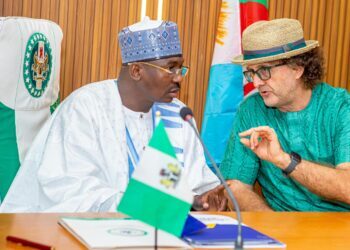Yiaga Africa, on Wednesday, officially launched the Ekiti chapter of the People’s Assembly for effective communication and deliberation among the citizens, groups and executives of Ado Local Government Area (LGA).
The News Agency of Nigeria (NAN) reports that Yiaga Africa is a non-profit civic hub of change makers committed to the promotion of democratic governance, human rights and civic engagement.
Yiaga Programme Officers in Ado-Ekiti convened the gathering to enlighten citizens, groups and Ado LG officials on their roles and duties on service delivery, especially on the dividend of democracy.
In an address of welcome, a Senior Programme officer of the group, Mrs Anthonia Onda, commended the people, groups, executive members of Ado LGA for creating time to attend the programme.
Onda said the objective of the People’s Assembly was to bring together citizens, various associations, Ado council officials “to have effective interactions, deliberations and debate on the needs of the people at the grassroots”.
She urged participants to be free to discuss the challenges confronting their communities, streets and local areas “to enable the local government authorities to proffer adequate solutions to them”.
Another Yiaga Programme Officer, Mr Olaniyan Sanusi, described the People’s Assembly in the LGA as apt and necessary to promote public deliberations and improve citizen’s participation in democratic governance.
Sanusi0ĺ said that the People’s Assembly, which was first established in Lagos in 2022, had been replicated in six LGAs of the state.
”We are moving the establishment of People’s Assembly to 12 LGAs in 12 states in the country and six geopolitical zones, starting with Ekiti.
”The People’s Assembly is the initiative of Yiaga Africa, situated within a project called, “Citizens deliver.
“It is a form of deliberative democracy and it is basically public promoted deliberation.
”We are expecting to see citizens under the People’s Assembly group in Ado LGA deliberate on issues identified at the meeting today,” he said.
Sanusi, however, enlightened the participants on what democracy entails, the role of the LG officials and why the citizens must constantly interact with them to enjoy the dividend of democracy at the grassroots.
NAN reports that the leaders of Yiaga People’s Assembly in Ado LGA nominated Mrs Stella Omodele, Mr Gbenga Ariyo and Mrs Isabella Adeyemo to lead the body.
Their role is to always reach out to all groups, such as market women, artisans, residents and officials of Ado LGA for regular deliberations and interactions on the needs of the people at the grassroots.
Some of the issues deliberated upon that affect the citizens and residents of Ado LGA, included the lack of healthcare facilities in Ajebandele Street on Ikere-Ekiti Road and poor road network in Ado-Ekiti.
Others were the lack of good drains in Adebayo area in Ado-Ekiti, the lack of empowerment of small business owners, high levies and double taxation of shop owners and traders in the council area.
The dignitaries that attended the event included the Vice Chairman and Secretary of Ado LGA, Mrs Fausat Bello and Mrs Kehinde Olanipekun. (NAN)











